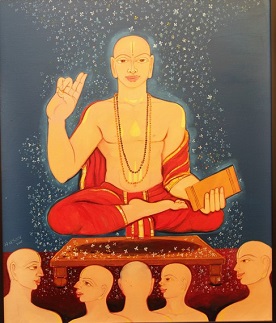Guru Raghavendra Swamy was a saint of the Madhwa philoshophy and sampradaya. Quintessentially, he preached the Dvaita Siddhantha, or Dualism, which emphasizes complete devotion and surrender to Lord Vishnu. A core system of belief, as established by the great Madhwacharya, based on the nine Prameyas or nine doctrines, which begin with Lord Vishnu being the Supreme Truth.
Guru Raghavendra Swamy is considered one of the most prolific exponents of the Madhwa Siddhantha. Throughout his tenure as pontiff and beyond, he advocated the principles of Dualism, a trajectory towards the path of the Lord and many humanitarian and uplifting values, as a natural outcome of this world view.
Guru Raghavendra Swamy is also remembered, and commemorated for bringing the concepts of human values, philosophy out of the classical closets through the path of devotion, to the masses. He believed, asserted and demonstrated that classical literatures, scriptures, documents, texts and their core essence had to reach the common man.
A path upheld to remove man from the path of banality, of mundane existence towards self-actualization cannot be limited to the literate elite. This had to reach ordinary folk, so they can live with and for an ideal, can go beyond the mortal and materialistic goals to a larger vision which had phenomenal values like compassion, benevolence, devotion, and more.
He established new ethics and tenets for an exalted way of life including the importance of right living, social duties of mankind, significance of jnana or knowledge, replacing blind faith with true devotion, and more. He, thereby, set people on a life-changing course, a new destination whose journey would be determined by a deep inner transformation and cleansing of the soul. In this context, he created several classical literary works, commentaries, discourses which emphasized the need to get on the path of the Lord Vishnu.

